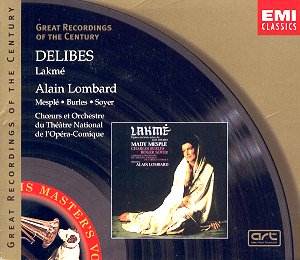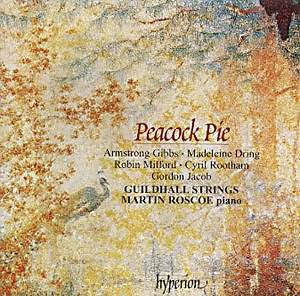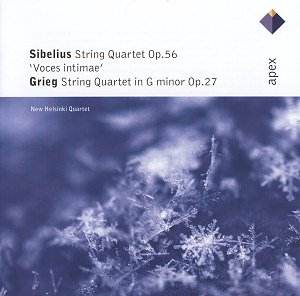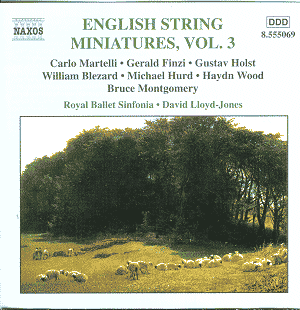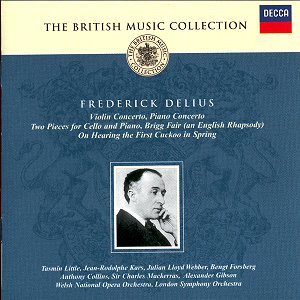 Composer: Frederick Delius (1862-1934)
Composer: Frederick Delius (1862-1934)
Works: Violin Concerto, Piano Concerto, Two Pieces for Cello and Piano: Caprice and Elegy, On Hearing the First Cuckoo in Spring, Brigg Fair (An English Rhapsody)
Performers: Tasmin Little (violin), Jean-Rodolphe Kars (piano), Julian Lloyd-Webber (cello), Welsh National Opera Orchestra conducted by Sir Charles Mackerras, London Symphony Orchestra conducted by Alexander Gibson, Bengt Forsberg (piano), London Symphony Orchestra conducted by Anthony Collins
Recording: Various dates: Violin Concerto (1991), Piano Concerto (1969), Caprice and Elegy (1996), On Hearing the First Cuckoo in Spring (1990), Brigg Fair (1953)
Label: DECCA
Frederick Delius, a composer whose musical voice embodies the synesthetic evocation of the English countryside, often draws listeners into a realm where sentiment and nature intertwine. This collection of Delius’s works showcases the rich tapestry of his oeuvre, revealing not only his individual style but also his deep connections to the broader currents of early 20th-century music. The selections here span various genres, from concertos to orchestral rhapsodies, each highlighting Delius’s characteristic lyrical beauty and evocative orchestration.
Tasmin Little’s interpretation of the Violin Concerto is a standout moment in this compilation. Her performance captures the essence of longing that permeates the opening phrase—a theme that is both haunting and tender. The seamless flow of the single-movement structure presents a unique challenge, yet Little navigates the intricate passages with finesse, particularly during the cadenza, where her technical prowess meets emotional depth. The Welsh National Opera Orchestra, under Sir Charles Mackerras, provides a lush backdrop, allowing the violin to soar in the final allegretto section, where the orchestral tutti bursts forth with joyous exuberance. This interplay is executed with an infectious vitality that makes the concerto a work to be cherished and revisited.
Jean-Rodolphe Kars’s rendition of the Piano Concerto offers a striking contrast. The work, initially conceived in three movements and later revised into a single movement, reflects Delius’s evolution as a composer. Kars’s interpretation is imbued with a sense of nostalgia, particularly in the delicate opening phrases that evoke Grieg’s influence. His ability to balance the contrasting light and dark passages is commendable, and the orchestra, led by Alexander Gibson, supports him with an understanding that enhances the dreamlike quality of the music. The climactic moments are supported by a robust orchestration, drawing a powerful conclusion that feels both resolved and expansive.
The two pieces for cello and piano, Caprice and Elegy, are poignant testaments to Delius’s later style, composed during a time when he faced significant physical challenges. Julian Lloyd-Webber and Bengt Forsberg’s performance imbues these miniatures with a rich sensitivity; the Caprice’s rippling piano phrases and the Elegy’s emotional contrasts resonate deeply. These pieces, while brief, encapsulate the bittersweet essence of Delius’s late works, conveying both despair and fleeting joy with remarkable clarity.
On Hearing the First Cuckoo in Spring, one of Delius’s most beloved works, is given a vibrant reading by the Welsh National Orchestra. Its folk song influences and strong English character are evident, with Mackerras effectively drawing out the pastoral qualities that have made this piece a staple in the repertoire. The orchestration’s delicate layering evokes the imagery of spring, as the title suggests. Similarly, Brigg Fair, conducted by Anthony Collins, weaves a nostalgic narrative through its thematic variations, capturing the essence of rural England. Collins’s interpretation, while somewhat idiosyncratic, reflects a keen understanding of Delius’s musical language, though the mono sound quality occasionally feels restricted.
This Delius compilation, with its blend of orchestral and chamber works, stands as a testament to the composer’s lyrical genius and his rich engagement with the landscape of his homeland. The performances are uniformly strong, with each artist bringing their unique interpretations to Delius’s textured soundscapes. The engineering, while variable due to the historical context of some recordings, does not detract significantly from the overall enjoyment. Each piece contributes to a cohesive narrative that is both intimately personal and universally resonant, making this collection a valuable addition to any exploration of British music.
